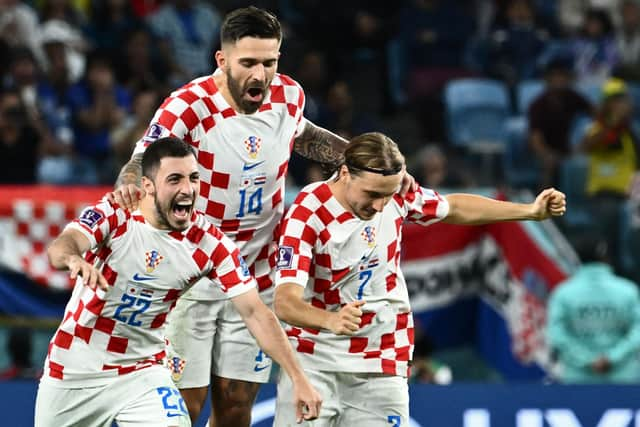Celtic and Rangers World Cup first this millennium as Croatia reach quarter-final with shoot-out win over Japan
In the compelling, nip-and-tuck encounter, producing the first penalty shoot-out of the knock-out stages in Qatar with the score tied at 1-1 following extra-time, the occasion will be globally remembered for Dominik Livakovic’s endeavours. However, folk in these parts may recall it for different reasons.
The Croatian hero became only the third goalkeeper in World Cup history to save three spot-kicks in a shoot-out, to send his country through to face Brazil or South Korea. Japan’s inability to beat Livakovic marked a cruel end to a stunning campaign wherein they were seeking to go further than ever before following group wins over Spain and Germany.
Advertisement
Hide AdAdvertisement
Hide AdIn the midst of all this, though, the more parochially-minded were served up Celtic and Rangers sidelines that made it decidedly rare among recent editions of the finals. With Borna Barisic replacing the ill Borna Sosa at left-back for his first involvement in Qatar, the Ibrox defender joined Josip Juranovic of Ange Postecoglou’s side in the Croatia starting line-up. No team in the World Cup this millennium had previously featured players from both Celtic and Rangers in its starting XI. Such a Glasgow double last came with Rangers Brian Laudrup and Celtic’s Marc Reiper in the Denmark side that was beaten 3-2 by Brazil in the quarter-final of France ‘98.


The stand-out Scotland-based contributor in the 90 minutes that preceded a fraught end, though, was an opponent of the pair in Juranovic’s Celtic team-mate Daizen Maeda. A blur in blue for Japan, the striker demonstrated he could be about more than the incredible energy levels that see him hustle and harry defences with eye-popping relentlessness. A sort who would chase a crisp packet on a windy day, the 25-year-old’s composure is considered hardly the measure of his appetite for industry. However, Maeda demonstrated a goal sniffer’s instinct two minutes from the interval, when he pounced to poke in from eight yards after a short corner played into the box by Ritsu Doan was pushed into his path by the outstretched leg of Maya Yoshida. Only the second international goal for the Celtic man across 12 caps, both have come since his move to Scotland a year ago.
And in a club context, the strike made Maeda only the fourth Celtic player to net at the World Cup in the 2000s, following Giorgos Samaras for Greece in 2014, Shunsuke Nakamure for Japan in 2006 and Henrik Larsson in 2002.
Deserved reward for Japan’s drive against a disjointed Croatia – with Barisic struggling to cope with the pace of wide man Jonya Ito – the finalists from four years ago jemmied their way back into the confrontation with a 54th minute equaliser ensuing from a Dejan Lovren right-wing cross that Ivan Perisic met with venom to send a downward header into the bottom corner.
Japan lost a little of their fizz thereafter – Maeda burning himself out to be withdrawn just after the hour – but Croatia remained stodgy, even as they passed up a couple of glaring opportunities to win in normal time. In Livakovic they had the match winner, though, as Croatia’s tournament experience told as they extended their World Cup shoot-out success-rate to three-from-three.
Comments
Want to join the conversation? Please or to comment on this article.